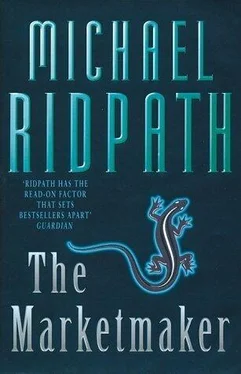Luís opened his mouth to protest.
‘Offering more money won’t get Isabel released any faster, believe me.’
Luís saw the logic and nodded.
‘I suggest we start off with a million dollars, then move it up in half-million chunks until we get to two million. Then we need to raise our offer in ever smaller amounts so that it seems as though each rise is a struggle. We will aim to stop the negotiations just short of three million.’
It seems a long way to come down from fifty million to one million,’ said Luís doubtfully.
‘Believe me, one million is a big first offer for a kidnapping.’
We believed him. Zico called on Thursday night. He treated Luís’s offer of one million dollars with derision. He said he knew that Luís owned Banco Horizonte. Luís explained that he only owned part of it, and that he couldn’t sell his stake. He performed well. He sounded cool at the beginning, and then as the conversation went on he displayed more tension. His assertion that he couldn’t raise more than a million sounded credible to me.
I listened to the tape played back. Although I couldn’t understand what was said, I was fascinated by Zico’s voice. Calm, measured, cold, intelligent. The compulsory threats to Isabel had none of the mindless violence of the first hoax caller. But the coldness was menacing in its own way. Zico wouldn’t kill Isabel unless it suited him. But if it suited him...
The police came. They took the tape of the conversation away for analysis of Zico’s voice. They had traced the call to a mobile phone somewhere in a crowded shopping street in the northern zone. Mobile phones were common in Rio. The land-line system was so bad that its citizens had been driven to using them instead. And they were virtually impossible to trace.
A dozen policemen were searching the Tijuca forest but so far they had found nothing.
Maria fussed over both Luís and me. She seemed to be taking it well, until she would suddenly run from the room, trying to hold back tears. Cordelia would come round for a couple of hours every day, but she found the waiting stressful. She had become withdrawn, a different person from the tough woman I had met at the children’s shelter. She had stopped going there. Just for the time being, she said.
I stayed at Luís’s apartment during the day, and my hotel at night. A couple of times I went out for walks through the wealthy streets of Ipanema. It was good to get out into the world, to see people shopping at the expensive boutiques, to wander past the up-market stalls selling flowers or rugs or Indian jewellery. Ipanema was a forest of luxury apartment buildings crammed together between the beach and the lagoon. Every now and then an old colonial-style building squatted among them, but old by Ipanema’s standards probably meant less than fifty years. I found a pleasant bar in one of these and stopped for a beer. I had read somewhere that ‘The Girl from Ipanema’ had been written by a man who hung out in a bar somewhere round here, watching the local talent go by. There were indeed many young, tanned and lovely girls who walked past. But they just reminded me of Isabel.
I tried to imagine where she was, what kind of state she was in. Was she well fed? Was she allowed to wash? It was hard for us here, it must be harder for her there. But she was a strong woman mentally. If anyone could cope with an ordeal like that, she could.
I shouldn’t have left her alone. I shouldn’t have left her alone!
I avoided Ipanema beach. After the kidnap, I had forgotten my stabbing there. I wanted it to stay forgotten. My fears of money-laundering and concerns about Dekker were pushed to the back of my mind. I just wanted Isabel to be freed.
I spoke to Ricardo regularly, keeping him informed of the progress of negotiations. It was comforting to hear Ricardo’s calm voice every day. He seemed impressed with Nelson as a negotiator. He was happy to continue footing the bill for the hotel. He had spoken to Luís, who had made a firm request that I be allowed to stay.
I spoke to Jamie, too. He was sympathetic. He said the whole office was in shock. But life had to go on. In particular, selling the Mexico deal had to go on. It wasn’t going well, and there were still a lot of bonds on Dekker’s books. The situation in Mexico itself was looking rocky: people were beginning to ask questions about whether the government would be able to refinance its borrowings that were maturing this year.
I didn’t care.
The police came again. They had fitted Zico’s voice to two previous recordings they had taken of kidnappers. In both cases the victims had been treated well and eventually released. This lifted Luís’s spirits. And mine.
But the waiting began to weigh heavily on us. It had been only four days since Isabel had been kidnapped, but it seemed much longer. Nelson warned us to be prepared for a long wait. These cases took weeks, sometimes months to resolve, not days. Nonetheless every time the phone rang, Luís, Cordelia and I thought it would bring an agreement for Isabel’s release. Of course it didn’t.
At Cordelia’s suggestion, we went up to Luís’s fazenda near Petrópolis for the weekend. It was what the family usually did, and she felt a change of scene would be good for Luís. He was worried that Zico wouldn’t be able to get in touch with us, but she pointed out that if he called the apartment and someone gave him the number in Petrópolis, he could hardly object.
Luís picked me up from the hotel late Friday afternoon. His chauffeur took us to the compact Santos Dumont airport in the centre of the city. I was surprised, Petrópolis was only forty kilometres away, no one had explained we would be flying. Luís was distracted as he led me through the airport and into a little van that took us to a blue helicopter. It had five seats, and Cordelia and her husband were already waiting for us. I climbed in too, pretending that this was the most natural thing in the world. Within a couple of minutes the helicopter had eased itself into the air and we were scudding across Guanabara Bay.
Twenty minutes later we were up above the mountains. Below us roads and buildings wriggled like snakes through the folds of the hills. We descended so that the forest-clad mountainsides rose on either side. We burst round a corner and there, beneath a sheer rock-face, was a large white house surrounded by a lush garden dotted with trees and a lake. Behind the house was a patch of flat grass with a large white H painted on it.
The fazenda had been the focal point of a substantial coffee estate. Its rooms were large and cool. The furnishings were tasteful without being opulent: dark colonial Brazilian wood, oriental vases, French nineteenth-century paintings. It was a few degrees cooler than Rio, but it was still warm by my standards. Nevertheless a huge fire roared in the sitting room.
As soon as we arrived, Luís relaxed visibly. I could understand why Cordelia had insisted on it. It was his routine to come up here and unwind on a Friday evening; and unwind was what he needed to do now.
That evening the atmosphere was almost normal. Cordelia’s husband, Fernando, was good company. He was a lawyer who had a wry sense of humour, and an inability to take himself, or Brazil, too seriously. He doted on Cordelia, though.
We were laughing, actually laughing, at dinner, clustered round one end of a ridiculously long dining table, when the phone rang.
There was an extension in the dining room. We could tell from Luís’s reaction who it was. Luís was prepared. He acted distraught but in control. The conversation lasted less than two minutes. Zico said one million dollars was insulting. Luís said fifty million was absurd. Zico wouldn’t budge. Luís upped his offer to a million and a half. He wanted Zico to know that he understood the game, and he was playing.
Читать дальше












